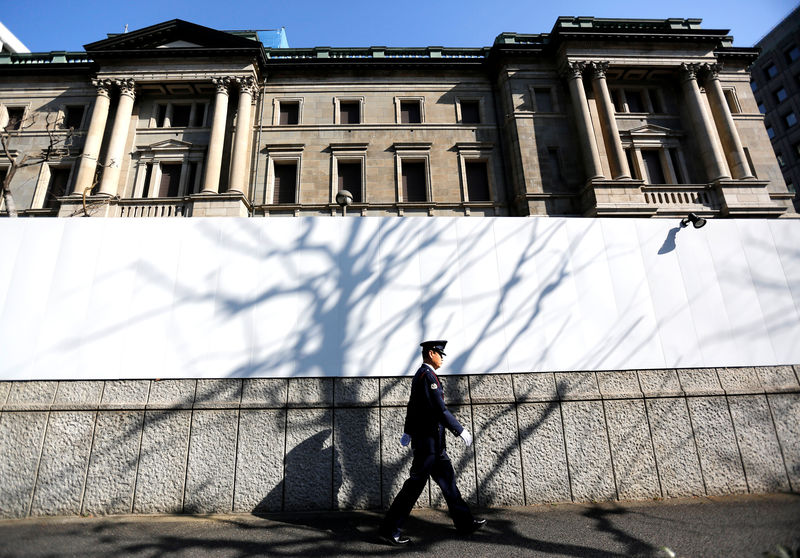 © Reuters. A security guard walks past in front of the Bank of Japan headquarters in Tokyo
© Reuters. A security guard walks past in front of the Bank of Japan headquarters in TokyoBy Stanley White
TOKYO (Reuters) – Bank of Japan policymakers disagreed over the appropriate level of bond yields, minutes from the central bank’s meeting last month showed in a sign of the strain on the BOJ’s monetary framework as the global economy weakens.
One member said long-term yields should be allowed to temporarily turn negative, according to minutes of the central bank’s Dec. 19-20 meeting released on Monday. The minutes do not identify the board members by name.
Another member agreed, saying yields have fallen due to worries about the U.S.-Sino trade war and that conducting market operations to raise yields would tighten monetary policy.
Yet another member said the BOJ should strengthen policy to reach its 2 percent inflation target.
In contrast, one member said long-term yields need to be higher to ease the burden on the financial system and make corporate bonds more attractive to investors. This member also said revising the BOJ’s government bond purchases is one future option.
Rising pressure from the trade war between China and the United States — Japan’s biggest trading partners — is weighing on the world’s third-largest economy and undermining years of efforts by policymakers to foster durable growth.
“One member expressed the recognition that… long-term yields should be allowed to temporarily turn negative,” the minutes showed.
“The member continued that it was natural for such yields to move more or less symmetrically from around zero percent.”
At the meeting, the BOJ kept policy on hold. At a subsequent meeting on Jan. 22-23, the central bank cut its inflation forecasts but left its massive monetary easing in place.
The BOJ’s massive government debt purchases have had some unintended consequences, as years of low rates hurt financial institutions’ profits.
The central bank has also amassed a lot of exchange-traded funds in its marathon asset buying spree, which risks distorting financial markets.
Many BOJ policymakers are wary of ramping up stimulus, though external shocks or a sudden spike in the yen could force the central bank to do just that if the economy is at risk of sliding into recession.
Fusion Media or anyone involved with Fusion Media will not accept any liability for loss or damage as a result of reliance on the information including data, quotes, charts and buy/sell signals contained within this website. Please be fully informed regarding the risks and costs associated with trading the financial markets, it is one of the riskiest investment forms possible.
Source: Investing.com




























